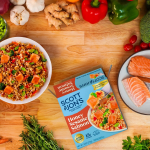The Checkout: Retailers Reveal All, Raise Funds & Rankle Suppliers
Welcome to The Checkout: an express lane for weekly news you need to know, always 10 items or less.
If retailers want to offer a varied portfolio of products, they can’t just sit back and relax: They need to court suppliers. To not only retain but also attract new customers, grocers and retailers are now embracing new technologies, platforms and marketing tactics. .
From private supplier meetings and investment news to insights and advice coming out of the retail and ecommerce conference, ShopTalk, this issue of The Checkout takes a closer look at the news around the retail outlets themselves.
Whole Foods Works to Ease Supplier Concerns
This week, natural products retailer Whole Foods Market met with roughly 200 of its suppliers at its headquarters in Austin. The summit was an attempt to ease the concerns around new supplier fees, a reported mass exodus of executives, and a long awaited rollout of a centralized buying system.
During the meeting, the company addressed the looming April 1 deadline it has placed on suppliers to agree to a new three percent supplier fee that the retailer has said will be for merchandising services currently provided by brokers.
According to Forbes, A.C. Gallo, Whole Foods president and COO, told attendees that the fees should not have an effect on brands’ bottom lines, and that the changes are to offset operational costs as the retailer centralizes its buying system.
Overall, Gallo tried to ease concerns about quality control and attracting innovative brands by stressing that the company is not going to eschew doing business with regional, smaller brands, Forbes reported. He noted that the company added about 700 new local suppliers last year and will “continue to do that.”
Digital Micro-grocer Farmstead Secures $2 M
Online grocery platform , Farmstead, announced earlier this week that it closed $2 million in funding. The round was led by Resolute Ventures and Social Capital, with additional participation from SV Angel and Y Combinator. To date, the new AI-powered, digital, micro-grocer has raised $4.8 million in seed funding.
Farmstead’s AI platform allows consumers to order local food items to be delivered within 60 minutes and curates — in a NetFlix-esque style — recommendations of new products for consumers try. The technology also appeals to brands for its ability to help food producers predict how much perishable product to make or harvest each week based on expected sales. According to the company, up to 45 percent of perishable food is wasted among grocery players, but Farmstead’s food waste is less than 10 percent.
“As Farmstead continues to grow at breakneck speed, this latest round of seed funding will allow us to scale our successful digital grocer model and expand our AI technology to reinvent the act of putting food in the fridge for everyone,” said Farmstead CEO and co-founder Pradeep Elankumaran. “At the same time, our AI has enabled us to reduce food waste and boost margins, creating a new paradigm for the traditionally wasteful 1.4 trillion food industry.”
Kroger is Commercializing Its Intellectual Properties
For those retailers who aspire to be “the next Kroger” a solution may be available — for a price.
Kroger has long been an early adopter of technology, embracing innovations like its digital shelf-edge and automated temperature monitoring systems early on. Now the company has established a division called Sunrise Technologies LLC to commercialize its technologies, Annette Franke, Kroger VP of customer experience network and Sunrise COO, said during a presentation at Shoptalk in Las Vegas Tuesday.
The suite of offerings, Kroger Edge, enables a retailer to not only digitally display pricing and nutritional information for all of its products, but it also gives a retailer the ability to instantly change prices and activate promotions across its stores, sending messages to shoppers through handheld devices or an app. According to reports, Kroger is already talking with “multiple retailers on multiple continents” about the new system.
Why is this important? Because, according to The Wall Street Journal, hundreds of executives gathered for this conference to answer this very question: Can traditional retailers keep pace with consumers as they increasingly use technology to shop? This move by Kroger would suggest that, yes, they can indeed.
Notable Female Execs Dislike “She” Consumer Concept
The purchasing power of women is incredibly strong. But how retailers and companies are speaking to that consumer could use a little work — a topic that some of the leading businesswomen in retail spoke about at ShopTalk this week.
AdWeek reported on the panel, called “The Power of Women in Retail,” which featured Tina Sharkey, co-founder of Brandless, Rachel Drori, founder of Daily Harvest, Marisa Bertha, director of business development and 7-ventures at 7-Eleven, and Sophie Miller, head of shopping partnerships, Google AR/VR. They spoke about the challenges of being women in business and why they think the retail world needs to rethink how it strategizes around the female consumer.
The panelists said they have problems with the “she” concept because it promotes broad generalizations about women shoppers, AdWeek reports.
“Who are we to tell someone who she is?” Drori said during the panel. “So lets put something out there into the world and let’s a two-way conversation with our customers all day long through every channel you can imagine and we iterate based on what customers want, as opposed to putting something out there that behind desks and in boardrooms is perfect for our customer.”

















